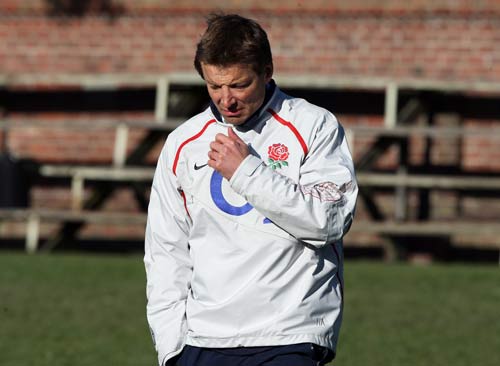England struggle to keep show on the road

Your support helps us to tell the story
From reproductive rights to climate change to Big Tech, The Independent is on the ground when the story is developing. Whether it's investigating the financials of Elon Musk's pro-Trump PAC or producing our latest documentary, 'The A Word', which shines a light on the American women fighting for reproductive rights, we know how important it is to parse out the facts from the messaging.
At such a critical moment in US history, we need reporters on the ground. Your donation allows us to keep sending journalists to speak to both sides of the story.
The Independent is trusted by Americans across the entire political spectrum. And unlike many other quality news outlets, we choose not to lock Americans out of our reporting and analysis with paywalls. We believe quality journalism should be available to everyone, paid for by those who can afford it.
Your support makes all the difference.They headed off to training at a school playing field down the road, kitbags slung over one shoulder and the cares of the world piled upon the other. England's rugby team, badly defeated by New Zealand in Auckland five days ago, set about preparing for their second and final meeting with the All Blacks this weekend in the uncomfortable knowledge that four among their number were the subject of a police inquiry into allegations that a “serious” offence had been committed in a hotel room at the dead of night.
It was an awkward and thoroughly miserable day for the tourists, who were under strict orders to avoid all discussion of the news and accompanying rumours following them south from New Zealand's biggest city. James Haskell, one of the best young players in the party, made a bold attempt at positive thinking ahead of the forthcoming game, considered by most to be a thankless task. "If you allow yourself to be distracted, you're in the wrong job," he said. But the air was thick with distraction, and few in the squad bothered to pretend otherwise.
The exact nature of the alleged incident – specific details of who, what and precisely when – remained unclear, despite the decision of the Auckland police to alert the public to their activities. Noreen Hegarty, speaking for the Auckland Criminal Investigation Bureau, said the alleged incident took place in the early hours of last Sunday at the five-star Hilton Hotel on the city's waterfront, where England had been based for their fixture at Eden Park. She would not, however, divulge the nature of the complaint received by her department, or say who had made it. She would not even confirm whether the alleged incident involved a female.
England's travelling lawyer, the Bristol-based barrister Richard Smith QC, was less forthcoming still, flatly refusing to answer questions. It was left to the acting head coach Rob Andrew, a former international outside-half, to address the issue. He reminded his audience that no formal complaint had been made, but said that he and his colleagues were co-operating fully with the police, and added: "Those concerned have the complete support of all players and management." He then disappeared at some speed.
Detectives interviewed staff at the Auckland hotel, but there was no suggestion that they had yet talked to any of the four players involved, or that anyone would be prevented from leaving the country when the tourists fly back to England early next week.
Visiting rugby teams have frequently run into strife in New Zealand, where the obsession with the union game is more consuming than anywhere else in the world. As far back as 1977, the British and Irish Lions were subjected to a lurid media campaign highlighting and exaggerating their extra-curricular activities.
There have been repeated disciplinary wrangles arising from on-field violence, the last of which, in 2002, persuaded Clive Woodward, who would manage England to World Cup victory a year later, to make Smith a regular part of the support staff. This, however, is different – and, according to the police, far more serious. No England player in the professional era has found himself in trouble with the law.
Richie McCaw, the New Zealand captain and one of the outstanding players in the sport, said there was increasing scrutiny of players' behaviour as the profile of the game, and its rewards, continued to grow. "The reality is that when you are an All Black, there are people watching," he said. "It's a simple fact, even if you're having time off, and there are occasions when people let their guard down. But as long as the enjoyment you take from the sport outweighs living in a fishbowl-type situation, you can accept it."
Join our commenting forum
Join thought-provoking conversations, follow other Independent readers and see their replies
Comments